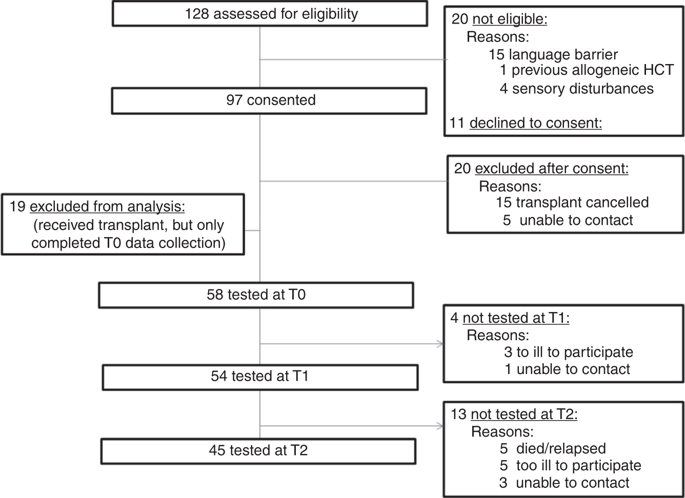当前位置:
X-MOL 学术
›
Bone Marrow Transpl.
›
论文详情
Our official English website, www.x-mol.net, welcomes your
feedback! (Note: you will need to create a separate account there.)
Predictors of the trajectory of cognitive functioning in the first 6 months after allogeneic hematopoietic stem cell transplantation.
Bone Marrow Transplantation ( IF 4.5 ) Pub Date : 2019-11-19 , DOI: 10.1038/s41409-019-0746-3 Samantha J Mayo 1, 2 , Hans A Messner 2 , Sean B Rourke 3, 4 , Doris Howell 1, 2 , J Charles Victor 5 , Jeffrey H Lipton 2, 6 , J Kuruvilla 2, 6 , Vikas Gutpa 2, 6 , Dennis Dong Hwan Kim 2, 6 , Fotios V Michelis 2, 6 , Kelly Metcalfe 1, 7
Bone Marrow Transplantation ( IF 4.5 ) Pub Date : 2019-11-19 , DOI: 10.1038/s41409-019-0746-3 Samantha J Mayo 1, 2 , Hans A Messner 2 , Sean B Rourke 3, 4 , Doris Howell 1, 2 , J Charles Victor 5 , Jeffrey H Lipton 2, 6 , J Kuruvilla 2, 6 , Vikas Gutpa 2, 6 , Dennis Dong Hwan Kim 2, 6 , Fotios V Michelis 2, 6 , Kelly Metcalfe 1, 7
Affiliation

|
Certain subgroups of patients may be particularly vulnerable to cognitive decline after treatment with allogeneic hematopoietic stem cell transplant (HCT). The objective of this study was to identify predictors of cognitive functioning changes within the first 6 months after HCT. Fifty-eight adults treated with allogeneic HCT (53% male, mean 48 years of age) completed neuropsychological tests of learning/memory, psychomotor efficiency/processing speed, and executive functioning/working memory at three time points: pre-HCT and day 100 and 6 months post transplant. On average, there was significant improvement in learning/memory (p = 0.002), psychomotor efficiency/processing speed (p < 0.0001), and executive functioning/working memory (p < 0.0001), at 6 months. Multilevel modeling identified predictors of divergence from this trajectory; Karnofsky performance status <80 was associated with worsening learning/memory over time; peak severity of acute graft-versus-host disease >=Grade 2 was associated with worsening psychomotor efficiency/processing speed; and greater years of education predicted a faster improvement in psychomotor efficiency/processing speed. Other factors were associated with cognitive functioning over time: higher intelligence quotient (IQ) was associated with better cognitive functioning, and older age, being male, and greater pretransplant comorbidities were associated with worse cognitive functioning. Overall, cognitive performance appears to improve over the first 6 months after transplant. However, pretransplant and posttransplant factors may influence this trajectory.
中文翻译:

异基因造血干细胞移植后头6个月认知功能轨迹的预测因子。
异基因造血干细胞移植(HCT)治疗后,某些患者亚群可能特别容易出现认知功能减退。这项研究的目的是确定HCT后头6个月内认知功能变化的预测因素。58名接受同种异体HCT治疗的成年人(53%的男性,平均48岁)在以下三个时间点完成了关于学习/记忆,心理运动效率/处理速度以及执行功能/工作记忆的神经心理学测试:HCT之前和第100天移植后6个月。平均而言,在6个月时,学习/记忆(p = 0.002),精神运动效率/处理速度(p <0.0001)和执行功能/工作记忆(p <0.0001)有显着改善。多级建模确定了偏离此轨迹的预测因子;Karnofsky的表现状态<80与学习/记忆力随着时间的推移而恶化有关。急性移植物抗宿主病的峰值严重度≥2级与精神运动效率/处理速度的恶化有关;随着教育时间的延长,精神运动效率/处理速度将得到更快的提高。其他因素与一段时间后的认知功能有关:较高的智商(IQ)与较好的认知功能有关,年龄较大的男性(男性)和更大的移植前合并症与较差的认知功能有关。总体而言,在移植后的最初6个月中,认知能力似乎有所改善。但是,移植前和移植后的因素可能会影响这一轨迹。急性移植物抗宿主病的峰值严重度≥2级与精神运动效率/处理速度的恶化有关;随着教育时间的延长,精神运动效率/处理速度将得到更快的提高。其他因素与一段时间后的认知功能有关:较高的智商(IQ)与较好的认知功能有关,年龄较大的男性(男性)和更大的移植前合并症与较差的认知功能有关。总体而言,在移植后的最初6个月中,认知能力似乎有所改善。但是,移植前和移植后的因素可能会影响这一轨迹。急性移植物抗宿主病的峰值严重度≥2级与精神运动效率/处理速度的恶化有关;随着教育时间的延长,精神运动效率/处理速度将得到更快的提高。其他因素与一段时间后的认知功能有关:较高的智商(IQ)与较好的认知功能有关,而年龄较大(男性)和更大的移植前合并症与较差的认知功能有关。总体而言,在移植后的最初6个月中,认知能力似乎有所改善。但是,移植前和移植后的因素可能会影响这一轨迹。随着教育时间的延长,精神运动效率/处理速度将得到更快的提高。其他因素与一段时间后的认知功能有关:较高的智商(IQ)与较好的认知功能有关,年龄较大的男性(男性)和更大的移植前合并症与较差的认知功能有关。总体而言,在移植后的最初6个月中,认知能力似乎有所改善。但是,移植前和移植后的因素可能会影响这一轨迹。随着教育时间的延长,精神运动效率/处理速度将得到更快的提高。其他因素与一段时间后的认知功能有关:较高的智商(IQ)与较好的认知功能有关,年龄较大的男性(男性)和更大的移植前合并症与较差的认知功能有关。总体而言,在移植后的最初6个月中,认知能力似乎有所改善。但是,移植前和移植后的因素可能会影响这一轨迹。和更大的移植前合并症与较差的认知功能有关。总体而言,在移植后的最初6个月中,认知能力似乎有所改善。但是,移植前和移植后的因素可能会影响这一轨迹。和更大的移植前合并症与较差的认知功能有关。总体而言,在移植后的最初6个月中,认知能力似乎有所改善。但是,移植前和移植后的因素可能会影响这一轨迹。
更新日期:2019-11-19
中文翻译:

异基因造血干细胞移植后头6个月认知功能轨迹的预测因子。
异基因造血干细胞移植(HCT)治疗后,某些患者亚群可能特别容易出现认知功能减退。这项研究的目的是确定HCT后头6个月内认知功能变化的预测因素。58名接受同种异体HCT治疗的成年人(53%的男性,平均48岁)在以下三个时间点完成了关于学习/记忆,心理运动效率/处理速度以及执行功能/工作记忆的神经心理学测试:HCT之前和第100天移植后6个月。平均而言,在6个月时,学习/记忆(p = 0.002),精神运动效率/处理速度(p <0.0001)和执行功能/工作记忆(p <0.0001)有显着改善。多级建模确定了偏离此轨迹的预测因子;Karnofsky的表现状态<80与学习/记忆力随着时间的推移而恶化有关。急性移植物抗宿主病的峰值严重度≥2级与精神运动效率/处理速度的恶化有关;随着教育时间的延长,精神运动效率/处理速度将得到更快的提高。其他因素与一段时间后的认知功能有关:较高的智商(IQ)与较好的认知功能有关,年龄较大的男性(男性)和更大的移植前合并症与较差的认知功能有关。总体而言,在移植后的最初6个月中,认知能力似乎有所改善。但是,移植前和移植后的因素可能会影响这一轨迹。急性移植物抗宿主病的峰值严重度≥2级与精神运动效率/处理速度的恶化有关;随着教育时间的延长,精神运动效率/处理速度将得到更快的提高。其他因素与一段时间后的认知功能有关:较高的智商(IQ)与较好的认知功能有关,年龄较大的男性(男性)和更大的移植前合并症与较差的认知功能有关。总体而言,在移植后的最初6个月中,认知能力似乎有所改善。但是,移植前和移植后的因素可能会影响这一轨迹。急性移植物抗宿主病的峰值严重度≥2级与精神运动效率/处理速度的恶化有关;随着教育时间的延长,精神运动效率/处理速度将得到更快的提高。其他因素与一段时间后的认知功能有关:较高的智商(IQ)与较好的认知功能有关,而年龄较大(男性)和更大的移植前合并症与较差的认知功能有关。总体而言,在移植后的最初6个月中,认知能力似乎有所改善。但是,移植前和移植后的因素可能会影响这一轨迹。随着教育时间的延长,精神运动效率/处理速度将得到更快的提高。其他因素与一段时间后的认知功能有关:较高的智商(IQ)与较好的认知功能有关,年龄较大的男性(男性)和更大的移植前合并症与较差的认知功能有关。总体而言,在移植后的最初6个月中,认知能力似乎有所改善。但是,移植前和移植后的因素可能会影响这一轨迹。随着教育时间的延长,精神运动效率/处理速度将得到更快的提高。其他因素与一段时间后的认知功能有关:较高的智商(IQ)与较好的认知功能有关,年龄较大的男性(男性)和更大的移植前合并症与较差的认知功能有关。总体而言,在移植后的最初6个月中,认知能力似乎有所改善。但是,移植前和移植后的因素可能会影响这一轨迹。和更大的移植前合并症与较差的认知功能有关。总体而言,在移植后的最初6个月中,认知能力似乎有所改善。但是,移植前和移植后的因素可能会影响这一轨迹。和更大的移植前合并症与较差的认知功能有关。总体而言,在移植后的最初6个月中,认知能力似乎有所改善。但是,移植前和移植后的因素可能会影响这一轨迹。











































 京公网安备 11010802027423号
京公网安备 11010802027423号